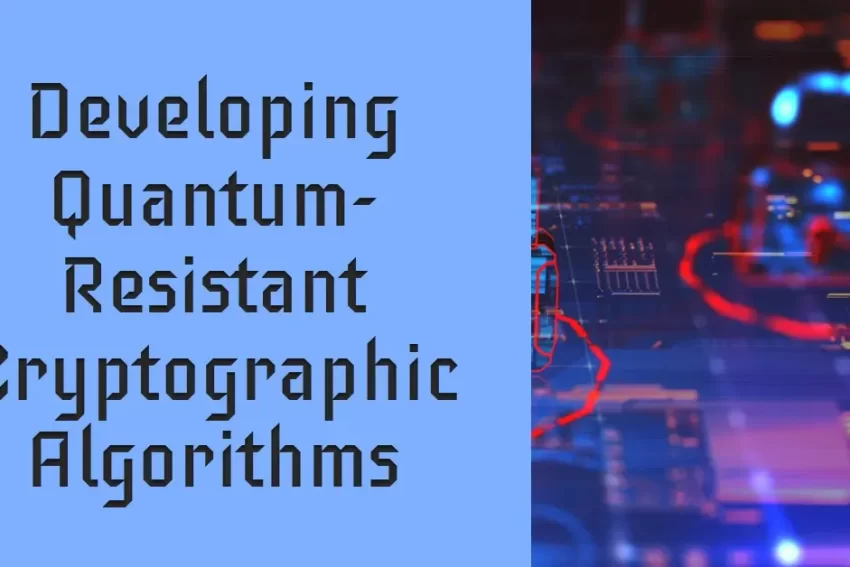In an era where technological progress is reaching incredible heights, quantum computing poses an existential threat to cryptographic systems. Because quantum computers promise exponential increases in processing power, traditional cryptographic algorithms risk becoming outdated, putting sensitive information and data at significant risk. This article delves into quantum-resistant cryptographic algorithms and pennsylvania internet providers, their development and their vital role in reinforcing digital security.
Understanding Quantum Computing
Overview of Quantum Computing
Understanding quantum-resistant cryptographic algorithms requires an in-depth knowledge of quantum computing basics. While traditional computers use bits to represent either zeroes or ones, quantum computers use quantum bits (qubits), which exist simultaneously as multiple states due to superposition principles and can, therefore, perform complex calculations at incredible speed, potentially undermining current cryptographic standards and becoming the basis of quantum resistant algorithms.
The Threat to Traditional Cryptography
Conventional cryptographic algorithms like RSA and ECC depend on complex mathematical problems for security. Yet, quantum computers could solve such issues faster than classic computers, compromising the confidentiality and integrity of encrypted data. Therefore, developing quantum-resistant cryptographic algorithms capable of withstanding the computational power of quantum adversaries has become urgent.
The Race for Quantum-Resistant Solutions
Symmetric Key Cryptography
One area of research into quantum-resistant cryptographic algorithms focuses on symmetric key cryptography. Symmetric key algorithms use a shared secret key for encryption and decryption; researchers are exploring new approaches that may withstand quantum attacks; lattice-based cryptography, hash-based cryptography, and code-based cryptography are promising candidates.
Asymmetric Key Cryptography
Asymmetric key cryptography involving public/private key pairs is another avenue for developing quantum-resistant solutions. Post-quantum algorithms utilizing hash functions, multivariate polynomials, or error-correcting codes may offer potential solutions to quantum computers’ vulnerabilities.
Pennsylvania Internet Providers in the Quantum Era
With its technological innovations playing an integral part across various industries, Pennsylvania must recognize the significance of an adequate internet infrastructure. Pennsylvania internet providers must remain diligent and proactive when adopting quantum-resistant cryptographic algorithms to safeguard businesses and individuals’ online environments from emerging threats; cutting-edge security measures contribute significantly to fortifying digital ecosystems against emerging dangers.
The development and implementation of quantum-resistant cryptographic algorithms represent an essential step toward digital security in Pennsylvania and beyond. As we transition further into quantum technology, collaboration among researchers, industry leaders, and government entities will play a crucial role in shaping an accessible digital future that remains secure and resilient.
Quantum Resistant Cryptographic Algorithms For Implication in Global Security Networks
Hash-Based Cryptography
Hash-based cryptographic algorithms have gained increasing attention as potential solutions against quantum attacks. Relying on one-way hash functions, these solutions make it computationally infeasible for quantum adversaries to reverse them and conduct reverse cryptography attacks on real data sets. Researchers are working tirelessly on refining and standardizing hash-based algorithms to ensure their practicality and security in everyday applications.
Lattice-Based Cryptography
Lattice-based cryptography stands out as an up-and-coming field of quantum-resistant algorithms. Lattice problems like the Shortest Vector Problem (SVP) and Learning With Errors (LWE) form the core of these algorithms – their complex solutions by quantum algorithms offer additional protection from quantum attacks. Ongoing research strives to optimize lattice-based cryptographic algorithms in terms of efficiency and performance.
Code-Based Cryptography
Code-based cryptographic algorithms rely on error-correcting codes for both encryption and decryption purposes. Error-correcting regulations add redundancy to information for error detection and correction, while linear codes present quantum adversaries with an extra difficulty level when decoding linear codes; ongoing research attempts to improve code-based cryptographic algorithms while keeping their quantum resistance.
Challenges in the Development of Quantum-Resistant Algorithms
Scalability and Efficiency
One of the key challenges associated with developing quantum-resistant cryptographic algorithms lies in their scalability and efficiency. Solutions must offer robust protection from quantum attacks and be suitable for implementation in different systems that contain limited resources like devices or networks.
Interoperability and Standardization
Adopting quantum-resistant cryptographic algorithms requires interoperability and standardization; as a result, the cryptographic community is actively working towards setting standards for post-quantum cryptography to facilitate seamless integration into existing security infrastructures.
Real-World Implications and Applications
Data Protection in Finance
Financial transactions containing susceptible data are particularly vulnerable to quantum attacks. Quantum-resistant cryptographic algorithms offer protection from potential attacks on financial transactions by protecting the integrity and confidentiality of sensitive data.
Securing Communication Networks
Communication networks such as the Internet rely heavily on cryptographic protocols for protecting data during transmission, with quantum-resistant algorithms playing an essential part in protecting these networks against emerging cyber threats and safeguarding user communications confidentiality.
Government Initiatives and Research Collaborations.
National Quantum Initiatives
Governments worldwide recognize the urgency of responding to quantum cybersecurity risks. National initiatives are allocating funds and resources to research and develop quantum-resistant cryptographic algorithms designed to strengthen national security against adversaries operating within this space. These projects will stay ahead of potential adversaries by staying one step forward.
Collaborative Research Efforts
Collaboration among researchers, academia, and industry experts is central to making progress on quantum-resistant cryptography possible. By pooling their resources and expertise together, the partnership helps accelerate the development and standardization of secure cryptographic solutions capable of withstanding quantum attacks.
Future Prospects and Emerging Technologies
Post-Quantum Cryptography in Quantum Key Distribution (QKD).
Integrating post-quantum cryptography and Quantum Key Distribution (QKD) offers exciting frontiers of quantum resistance solutions. QKD employs quantum mechanical principles to secure communication channels; adding post-quantum cryptography increases the overall resilience of cryptographic systems.
Quantum-Safe Cryptocurrencies
With the rapid adoption of cryptocurrency comes increased interest in quantum-resistant solutions for safeguarding digital assets. Quantum-safe cryptocurrencies strive to minimize quantum attacks on blockchain technology while upholding trust in decentralized financial systems.
Frequently Asked Questions (FAQs)
What is the primary threat that quantum computing poses to traditional cryptographic algorithms?
Quantum computing poses a substantial threat to traditional cryptographic algorithms because it solves specific mathematical problems exponentially faster than classical computers, endangering the confidentiality and integrity of encrypted data and necessitating the development of quantum-resistant cryptography algorithms.
How do symmetric key cryptographic algorithms contribute to developing quantum-resistant solutions?
Using shared secret keys for encryption and decryption, Symmetric key cryptography has emerged as an essential strategy in creating quantum-resistant solutions. Researchers are exploring various lattice-based, hash-based, and code-based cryptographic to enhance resilience against quantum attacks of these algorithms that utilize them.
What role are hash-based cryptographic algorithms playing in quantum-resistant cryptography?
Hash-based cryptographic algorithms are becoming more prominent due to their potential to withstand quantum attacks. Relying on one-way hash functions makes it computationally infeasible for quantum adversaries to reverse them and cause issues for the practical implementation of hash algorithms—ongoing research endeavors towards standardizing and optimizing these methods.
How do lattice-based cryptographic algorithms contribute to quantum-resistant cryptography, and what problems do they address?
Lattice-based cryptographic algorithms utilize the complexity of lattice problems such as the Shortest Vector Problem and Learning With Errors to repel quantum attacks and provide secure cryptographic systems that withstand them. These algorithms address quantum computing’s unique challenges while serving as a secure foundation.
What challenges arise with developing quantum-resistant cryptographic algorithms?
Scalability and efficiency remain two key challenges in developing quantum-resistant cryptographic algorithms. Solutions must offer comprehensive protection from quantum attacks and viable solutions suitable for implementation across diverse systems (including resource-constrained devices or networks ). At the same time, interoperability and standardization should also be prioritized as key considerations.
How are quantum-resistant cryptographic algorithms impacting data protection within the financial industry?
Quantum threats pose particular risks for financial services institutions that store large quantities of sensitive data. Quantum-resistant cryptographic algorithms offer protection from possible attacks against financial transactions by safeguarding the integrity and confidentiality of sensitive information.
What initiatives are governments taking to address the quantum threat to cybersecurity?
Governments around the globe recognize the urgent nature of addressing quantum cybersecurity threats. National quantum initiatives have been launched with dedicated resources and funding allocated towards researching and creating quantum-resistant cryptographic algorithms to strengthen national security.
How are collaborative research efforts contributing to advancing quantum-resistant cryptography?
International collaborations among researchers, academia experts and industry specialists are critical in furthering quantum-resistant cryptography research and standardization efforts. By pooling resources and expertise, collaborative efforts accelerate the development and standardization processes of robust solutions capable of resisting quantum attacks.
Which emerging technologies could influence the future of quantum-resistant cryptography?
Integrating post-quantum cryptography with Quantum Key Distribution (QKD) and creating quantum-safe cryptocurrencies are promising emerging technologies that could impact quantum-resistant cryptography shortly. Both innovations aim to strengthen the overall resilience of cryptographic systems against evolving threats in this quantum age.
Conclusion
As quantum computing evolves, developing quantum-resistant cryptographic algorithms has become essential to safeguard digital security. Researchers and industry stakeholders are working hard to meet these new threats; researchers collaborating closely on research papers devoted to cryptography have joined efforts to create standardized quantum-resistant algorithms designed for stability during this quantum revolution with pennsylvania internet providers. It remains crucial for them to establish long-lasting and scalable quantum-resistant algorithms to stay resilient during such times as this revolution occurs.




